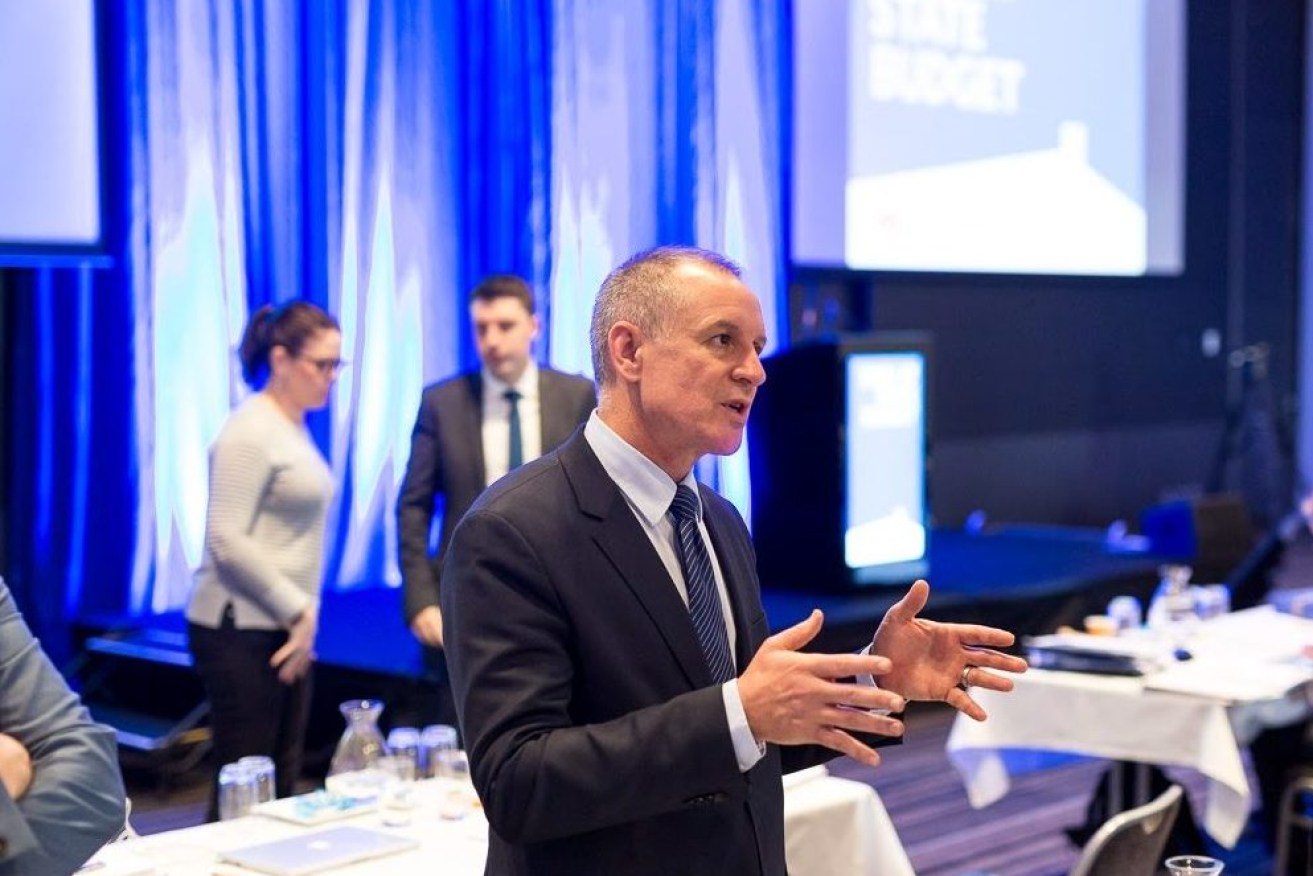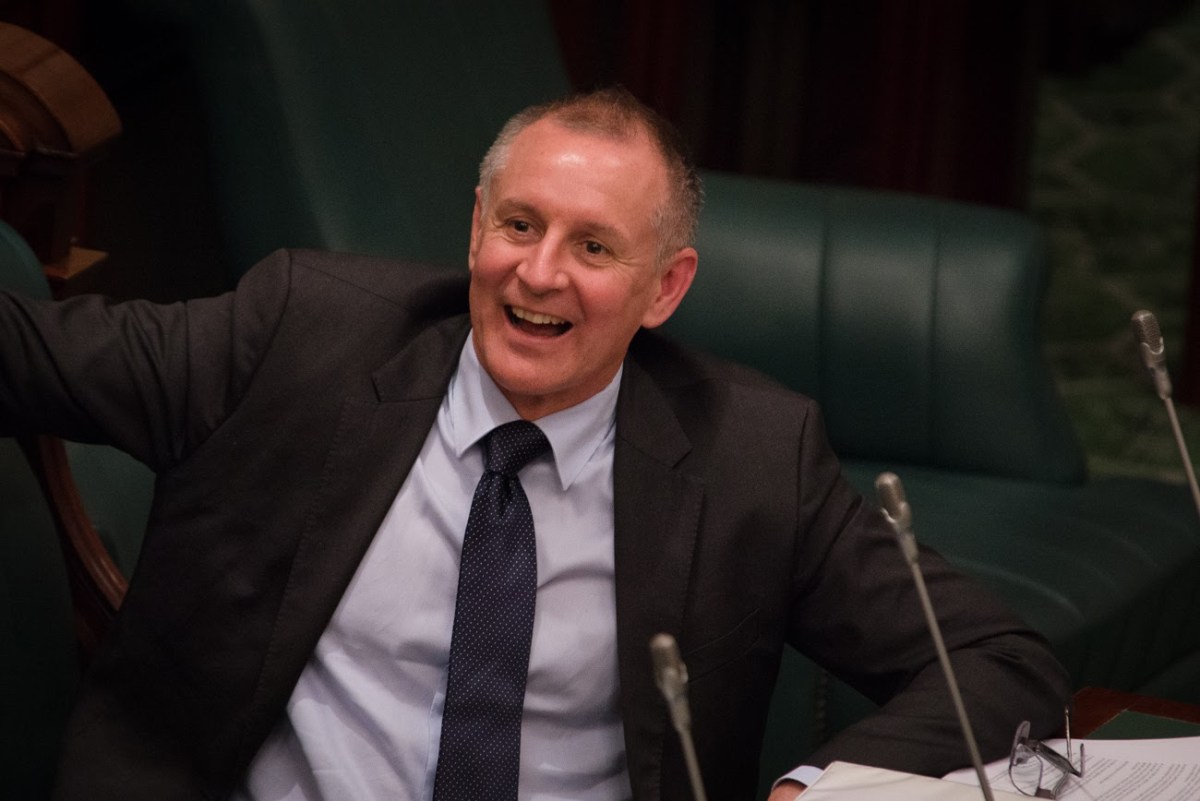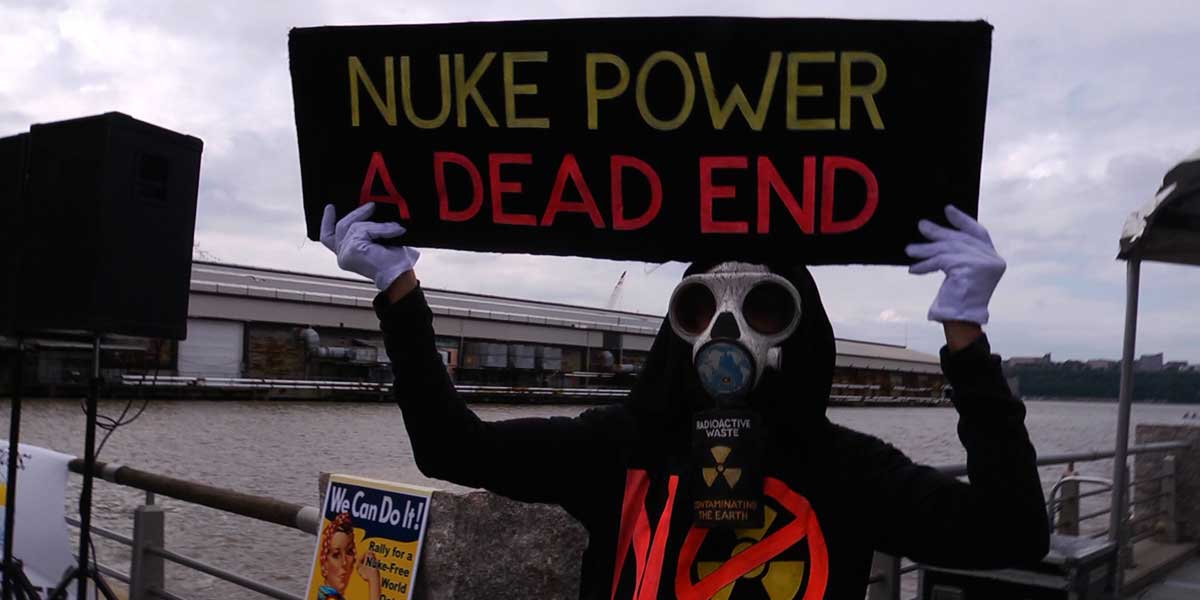Richardson: If he wants to be bold, Jay must genuinely advocate for nuclear
Reports of a Labor leadership crisis may have been greatly exaggerated, but there is a crisis of leadership in the nuclear debate, writes Tom Richardson.

NUCLEAR REACTION: Weatherill's latest gambit has put a lot of noses out of joint - but it has left the waste dump question on the table. Photo: Andre Castellucci / InDaily
It was the 1995 gangster flick The Usual Suspects that posited the notion the greatest trick the devil ever pulled was convincing the world he didn’t exist.
In five years as Premier, the greatest trick Jay Weatherill has pulled could well be convincing the world the nuclear debate did.
It’s hard not to look at his gambit this week – a gambit variously considered crazy-brave or cunningly calculated – through a purely political prism.
After all, politics is what politicians do.
It’s like that slogan for the old Education and Child Development Department that read ‘Children and young people are at the centre of everything we do’.
If you take out the ‘children and young people’. And replace it with ‘politics’.
But to understand Weatherill’s political success (thus far), one must appreciate what he believes has delivered it.
The Premier’s political playbook may be complicated, but his philosophy is really fairly simple.
He believes in selling hope and selling leadership.
Both of which would have been in short supply had he – as many expected (and indeed demanded) him to do – knocked the nuclear waste dump on the proverbial head.
(And yes: I still call it the ‘nuclear waste dump’ instead of the ‘high-level repository’, if nothing else because these debates aren’t won simply by finding a more feng shui euphemism.)
But putting aside the politics (can we?) for a sec, the upshot of Monday’s nameless, dateless referendum has been to keep the nuclear debate alive. Just.
Some have suggested it is effectively dead, but there remains a faint pulse.
This could be, perversely, just what the debate needs: a period of genuine reflection, without the confected political urgency.
It might mean the death of one of our great state pastimes – complaining about our economic stagnation
I genuinely don’t know whether Weatherill saw nuclear as a political showstopper or a genuine economic white knight, but either way he was naïve and foolish to believe he could effectively green-light such a scheme within one term of parliament.
The more gung-ho of advocates might have hoped in the face of Steven Marshall’s unilateral move to cruel the debate – a trench into which he dug himself ever deeper with increasingly strident rhetoric about a looming State Bank-style disaster – Weatherill would come out with all guns a-blazing and simply forge ahead, citizens’ jury be damned.
(Which, in many ways, it has been.)
What he did instead was more nuanced, but also more cynical.
Yes, he paid lip service to pursuing the pipe dream, while ensuring it remained as such for the foreseeable future.
But ponder this: if his aim was to neutralise the issue, why bother? Why bother, knowing it would nonetheless be viewed through that political prism as forging recklessly ahead towards an unpopular nuclear future?
One would hope it is because he genuinely believes in the opportunities inherent in the storage of spent nuclear waste.
Although one suspects it is because he is wedded to his belief that, in the end, the voters will reward “bold” leadership that makes them gasp – even if it is at the sheer chutzpah of it all.

“Sheer chutzpah?” Jay Weatherill’s response this week has been widely lambasted, but it got people talking. Photo: Nat Rogers / InDaily
But if Weatherill is being cynical, it is as naught to the stance of the state Liberals.
To be fair, we have so often lamented over the years their complete inability to grasp even the most basic concepts of political gamesmanship, that it seems churlish to begrudge them this, perhaps the most overt triumph of knee-jerk populism over coherent policy in their wilderness years history.
In the political barracking game that our state democracy has become, you could even praise them for tactically wedging Weatherill. But it is undeniably a poor governmental decision, and one that cuts against the grain of everything they have long believed and, indeed, been recently told.
It may be good politics (although it may not), but even if it pays off at the ballot-box, Weatherill would have one consolatory win: that of dictating the terms of the next Liberal administration.
Of ensuring that it enters office with a mandate not for action, but inertia.
Wouldn’t it be nice – just for once – for them to go to an election promising to do something, instead of promising to do nothing?
Perhaps the most overt triumph of knee-jerk populism over coherent policy
A vain hope, I realise.
This is South Australia, after all; a city-state whose capital once saw a Lord Mayor elected on the promise of leaving Victoria Square exactly as it already was.
Why, after all, would South Australians want something that promises to deliver billions of dollars to succeed?
It might mean the death of one of our great state pastimes – complaining about our economic stagnation and how nothing ever gets done to fix it.
This sense of affable futility permeates every aspect of our public life, not least the media.
After all, it’s easy to shoot these ideas down, because their opponents are always ready with a nifty prop and a soundbite.
On the day Weatherill announced his mythical referendum, there was an anti-nuclear protest outside the State Administration Building. Around 60 people.
Sixty.
Mind you, some of them were dressed as skeletons, which allowed every commercial news service to judge it worthy of a standalone story.
It is, of course, not hard to find an impassioned opponent of nuclear storage with a ready spray… and disproportionately difficult to find a vocal advocate willing to espouse the benefits.
One can’t really imagine, for instance, a Nigel McBride parading around outside parliament with a large novelty cheque made out to South Australia for $500 billion.
But this doesn’t mean the vocal opponents are a representative sample, nor does it make them right.
We saw the same thing happen a decade back with the Save the Parklands campaigners who cruelled Kevin Foley’s proposed grandstand on Victoria Park.
I can put my hand up on this one because, as a then-TV news reporter, you always knew where to go to find a ready-made voice of dissent. It was just too easy.
Now, the grandstand was loftily conceived and poorly sold, but does anyone really think we got a good result out of that, with the eastern fringe turned into a virtual construction site for a third of every year?
This current debate, though, is much more important than a grandstand on the parklands.
And of course, we’ve been here before, with the Rann Government’s NIMBYism on a low-level nuke dump – an issue that now hardly prompts an eyelid to bat – and the Channel 7 “I’m with Ivy” cynicism, wherein the network whipped up community hostility thanks to the endorsement of a telegenic septuagenarian.
But ask yourself this.
Why wouldn’t opponents of the waste dump welcome a referendum?
If it’s as universally unpopular as they claim, it would put the matter to rest once and for all.
Why wouldn’t opponents of the waste dump welcome further investigation?
If the figures are as rubbery as they claim, this will be demonstrated through a calm and careful public exposition.
For now, though, all we have are the feelpinions of a citizens’ jury which likened leading the world in nuclear storage to playing MySpace to a prospective competitor’s Facebook.
(They probably should have referenced the whole ‘Beta vs VHS’ thing for good measure.)
And this same citizens’ jury that Marshall so derided has now become the rationale for the Liberals ditching their long-held enthusiasm for all things nuclear.
The Liberal leader says he has no fears on the issue of safety, but insists “the economics simply don’t stack up”.
This is demonstrably untrue.
Here are facts.
The economic modeling used by the Scarce Royal Commission determined that storing spent fuel could yield annual revenue averaging $5.6 billion for the first 30 years of the dump’s operation, equivalent to more than a third of current revenue, with a further $2.1 billion a year for the 43 years thereafter.
A subsequent independent report by an internationally-credentialed consulting firm found that while it would be premature to decide on the project’s commercial viability based solely on the commission’s modeling, it is nonetheless “an acceptable starting point for further detailed, in-depth analysis”.
That isn’t code for: ‘drop the whole thing’.
It means ‘let’s keep having the discussion’.
Marshall says his Liberals have a greater ambition for our state – although what that might be remains unclear
It doesn’t mean the economics don’t stack up, because the economics are yet to be tested.
No-one has yet put a toe in the water, either officially or unofficially, with potential client countries.
Marshall says his Liberals have “a much greater ambition for our state than being the world’s dump”, although what that might actually be remains unclear.
It might have something to do with a new national park in the southern suburbs. We wait with bated breath.
Yesterday, the Liberal leader told parliament that “there are far more important and immediate priorities to pursue than this one”, as though as a state we can’t simultaneously walk and chew gum.
“We are united in our position, unlike this Labor government,” he continued. Again, this is patently false.
The partyroom may have closed ranks, but former senator Sean Edwards belled the cat this week when he told InDaily that nuclear politicking of this sort “will destroy what could be a very prosperous future for SA”.
“I’ll take on anybody on the economics, because the economics do stack up,” Edwards insisted.
Sure, it’s easy enough to dismiss the contribution of a former upper house MP who was bumped to a near-unwinnable position on his party’s ticket. But Edwards is no mere ousted senator; he’s a former state president of the Liberal Party.
His critique points to a crisis of ideology within the Liberal ranks, given that Marshall’s strident rhetoric has effectively closed the door on ever revisiting the nuclear question once in Government.
And yet, the intense focus this week has been on the apparent crisis in Weatherill’s leadership – based entirely on the fact that he didn’t do as the Liberals demanded by ditching the dump – and managed to annoy some left-wing unions in the process.
SA Unions secretary Joe Szakacs told the Advertiser Weatherill’s nuclear pig-headedness was “crazy or brave” (a backhanded political compliment if ever I’ve heard one) which prompted a round of speculation about the Premier’s future in the top job.
Perhaps a more pertinent question to ponder in such a scenario is the strategic brilliance of a union honcho destabilising the only left-faction Premier the ALP will ever tolerate?
These, of course, would be the same unions who opposed uranium mining for decades, until all of a sudden it became, too late, a Fairly Good Idea.
And then lamented the fact that their members were being laid off because we’d missed the commodities boom.
And anyway, what are the unions gonna do? Borrow the Steven Marshall playbook and tell everyone to vote Liberal?
But herein lies the rub: it’s easy for media to conflate genuine questions – and there are genuine questions – about nuclear into broader frustrations with the Labor Government and vague insinuations of leadership crises.
It’s easy, like finding a parklands protestor or a guy in a skeleton suit holding a phony barrel of green ooze.
But if we take the debate down that path, we all lose.
Maybe, indeed, it’s Marshall that’s “crazy-brave”.
Killing the nuclear debate for political advantage is a desperately short-sighted move
His unilateral insistence that nuclear was dead shows a decisiveness rarely seen publicly before now. And to be fair, it put an end to the political nonsense whereby Weatherill led the Liberal Party by the nose around the nuclear paddock.
But killing the nuclear debate for political advantage is a desperately short-sighted move; regardless of Weatherill’s fortunes, this debate deserves to be aired thoroughly and meticulously.

In matters nuclear, a man in a grim reaper outfit is never far away.
And in the end, it won’t be SA Unions or Steven Marshall that determine the Premier’s fate on this; he is steeped so far in yellowcake that returning is now harder than going forward.
By keeping the faint distant notion of a nuclear dream alive he can keep selling hope – but not indefinitely.
Weatherill has rightly judged that the electorate is tired of hollow promises, but the nuclear referendum – with the implausible caveat of “bipartisanship and community consensus” – will be fairly viewed as a cynical political exercise… unless there is one defining change in approach.
Jay Weatherill must now become a bona fide advocate.
Why wouldn’t opponents of the waste dump welcome a referendum?
It’s not enough to merely throw up his hands and say: “I’m just starting this discussion – now, over to you.”
He needs to fill the palpable void in making the case for nuclear storage: explain why the economics stack up, why the safety risks can be managed and why he has taken it upon himself to ignite this debate in the first place.
No referendum – even a hypothetical nameless, dateless one – can succeed without political leadership… and that is what is lacking in this fixated determination to “debate and decide”.
Weatherill must become the advocate the waste dump currently lacks.
Otherwise this nuclear vision will, like so many Labor pipe-dreams, be proved nothing more than a tale full of sound and fury, signifying nothing.
And told by… well, Shakespeare said it, not me.
Tom Richardson is a senior reporter at InDaily.




